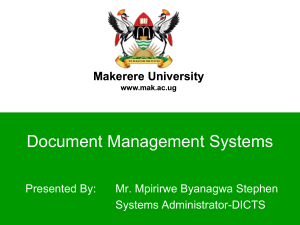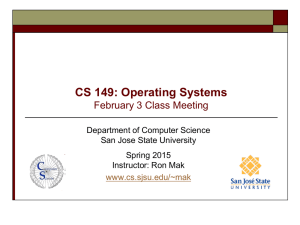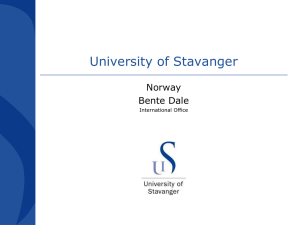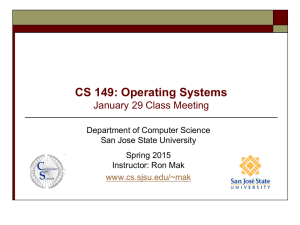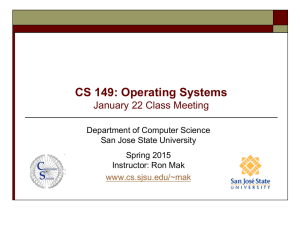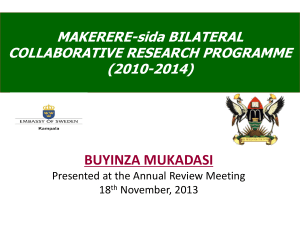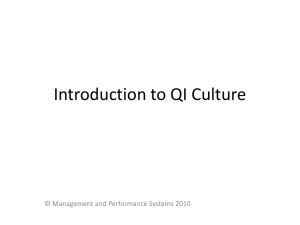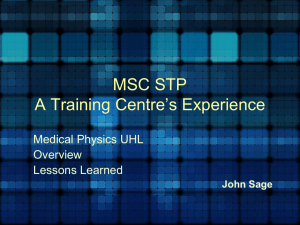J Wasswa IPICS Presentation 2013
advertisement
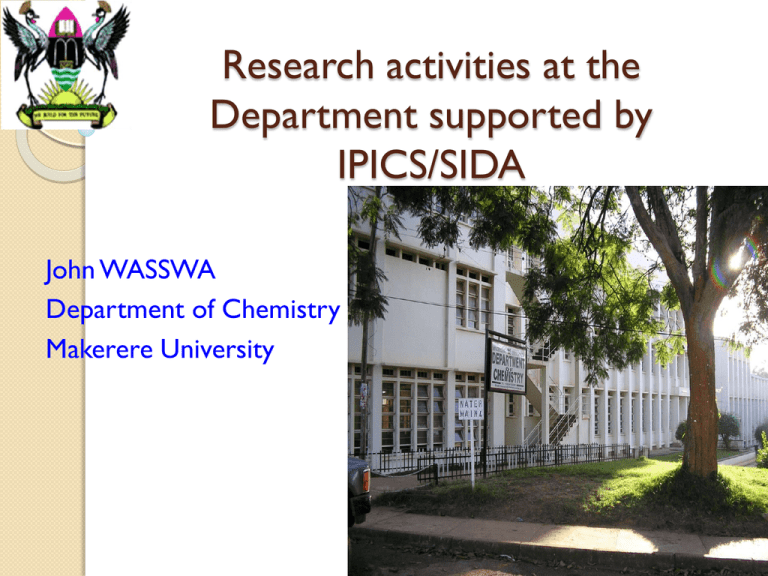
Research activities at the Department supported by IPICS/SIDA John WASSWA Department of Chemistry Makerere University 1 Prologue IPICS support since - 1999 Human resource capacity Environmental Chemistry (Pesticide Project UG 01) and Coordination Chemistry (Project) 2 PESTICIDE PROJECTCharacterisation Of Pesticide Residues In Biota, Water And Sediments In Lake Victoria –IP Prof. B. T. Kiremire Aim at strengthening capacity for research in Pesticides at Makerere University through active research cooperation and collaboration with institutions within the region and in Sweden. 3 Infrastructural development Prior to 2000, our residue analysis work was done in the laboratories of the Faculty of Veterinary Medicine and GAL. 2001, started to equip a fully-fledged pesticide residue laboratory within the department of chemistry By the end of the year 2002, our pesticide laboratory possessed three functional GC units. ◦ A UNICAM AT 610, equipped with only the FID and 2 Perkin Elmer units of Model PE 8500 one of which is equipped with ECD/FID and the other equipped with only the FID- Support from GTZ 4 The laboratory also possessed two gas generators for independent supply of Hydrogen and Nitrogen and an HPLC -GTZ In 2003, through IPICS funds, we secured a new GC unit (VARIAN CP-3800) equipped with both an ECD and a NPD. 5 GPC, Pressure controlled RotarVap, Deioniser, Ultrasonic bath Relevant Glassware 6 In 2008 secured an Agilent GC-MS through support from OPCW 2013 Secured HPLC –Through SIDA 7 Capacity building Trained 10 MSc students and 2 PhDs in residue analysis On going 4 PhDs 8 STUDENT John Wasswa Gabriel Kasozi QUALIFICATION MSc, PhD (Mak) MSc (Mak), PhD (UF-USA) CURRENT POSITION Staff Chem Dept (Mak) Staff Chem Dept (Mak) Sunny Mbabazi Christine Kyarimpa MSc (Mak) MSc (Mak) Kenneth Arinaitwe MSc (Mak) Patrick Ssebugere MSc (Mak) Muyisa Kavatsurwa Séverin Edward Mubiru MSC (Mak) Hasifa Nakayima MSc (Mak) Principal Analyst (DGAL) Staff Chem Dept (KYU), PhD Student (Mak) Staff Chem Dept (Mak), PhD Student (Mak) Staff Chem Dept (Mak), PhD Student (Mak) Democratic Republic of Congo (PhD fellow) Staff Chem Dept (Mak), PhD Student (Mak) QC (Quality Chemicals) Stella Nanyonga MSc (Mak) Staff Chem Dept (KYU), PhD Student Edwige Kampire MSc (Mak) Paul Mukasa Benon Nturishize MSc (Mak) MSc (MUST)-Access to facilities Kigali Institute of Technology (PhD fellow) Staff Chem Dept (Bugema) On going MSc (Mak) 9 Facilities benefited other research groups (natural products and the fish project) Hosted a number of colleagues from within the region (University of Dar es Salaam, UON-Kenya Uganda - member ANCAP since its inception in ANCAP 10 Hosted 3 summer schools (2002, 2005, 2009) Regional workshop on DDT(2004) International conference (SETAC-AFRICA 2009) 14 publications in internationally recognise journals Over 20 conference papers 11 Collaborators Prof. P. Kizza; University of Florida Prof. Shem Wandiga; UON Prof. Negguse Mergesa; University of Addis Ababa Prof. Kishimba (RIP); University of Dar-es Salaam, Prof. Mark Zaranyika University of Zimbabwe ANCAP Family 12 Current Research SIDA-Mak Multi-Matrix Contamination Levels, Trends and Biomagnifications of Persistent Organic Pollutants and Pesticides in Fish Food Web of Lake Victoria (Uganda) ◦ Aim: to establish the spatial and temporal trends of selected legacy POPs (including emerging POPs) in ambient air and precipitation samples taken from the Ugandan watershed of L. Victoria 13 Collaborators Derek C.G. Muir1, Camilla Teixeira1, Tom Harner2, Phil Fellin3, Robert E. Hecky4 1Environment Canada, Burlington, ON 2 Environment Canada,Toronto, ON 3 AirZoneOne Inc., Mississauga, ON 4 Biology Department, University of Minnesota, Duluth 14 Equatorial Africa Deposition Network AFull-sized project of the (GEF) spanning both the Land Degradation and International Waters focal areas. ◦ Implemented by the United Nations Environment Programme (UNEP) Aim: to establish a working dialogue between equatorial African Governments that focuses on the transboundary transport of major macronutrients in order to foster regional cooperation to advocate for changes in national and regional rural development programs. 15 Future work Deposition studies on POPs, emerging pollutants and other major macronutrients in other water bodies of Uganda 16 COORDINATION CHEMISTRY PROJECT Currently “the GREEN CHEMISTRY PROJECT” supported by SIDA/Mak – IP Prof. H. Ssekaalo MAJOR ACTIVITIES ◦ Development of catalysts for various synthetic processes ◦ Interactions of NPS derivatives with metal complex species and their applications 17 Major Equipment under IPICS/SIDA UV-VIS Spectrophotometer (Procured using IPICS Autumn money) Magnetic susceptibility balance High pressure autoclave reactor Automatic potentiometeric titrator Rotar evaporator Fume hood Polarization microscope Centrifuge Analytical balance pH/Ion selective meter and electrodes Computer and printer 18 Students Trained STUDENT QUALIFICATION CURRENT POSITION Emmanuel TEBANDEKE MSc, PhD (Mak) Staff Chem Dept (Mak) Solomon YIGA MSc (Mak) Staff Chem Dept (Mak), PhD Student (Mak) Peter MUSAGALA MSc (Mak) Staff Chem Dept (Busitema) Madina ADIA M MSc (Mak) Staff Chem Dept (Mak), PhD Student (Mak) Ibrahim KARUME MSc (Mak) PhD Candiate Nalumansi Irene MSc (Mak) Staff Chem Dept (MUST) Ronald Balaba MSc (Mak), PhD (USA) Faculty-USA 19 Publications and Proceedings 6 Publications in internationally recognized journals Over 15 conference papers 20 Thank you very much for your attention Tack så mycket för din uppmärksamhet 21
